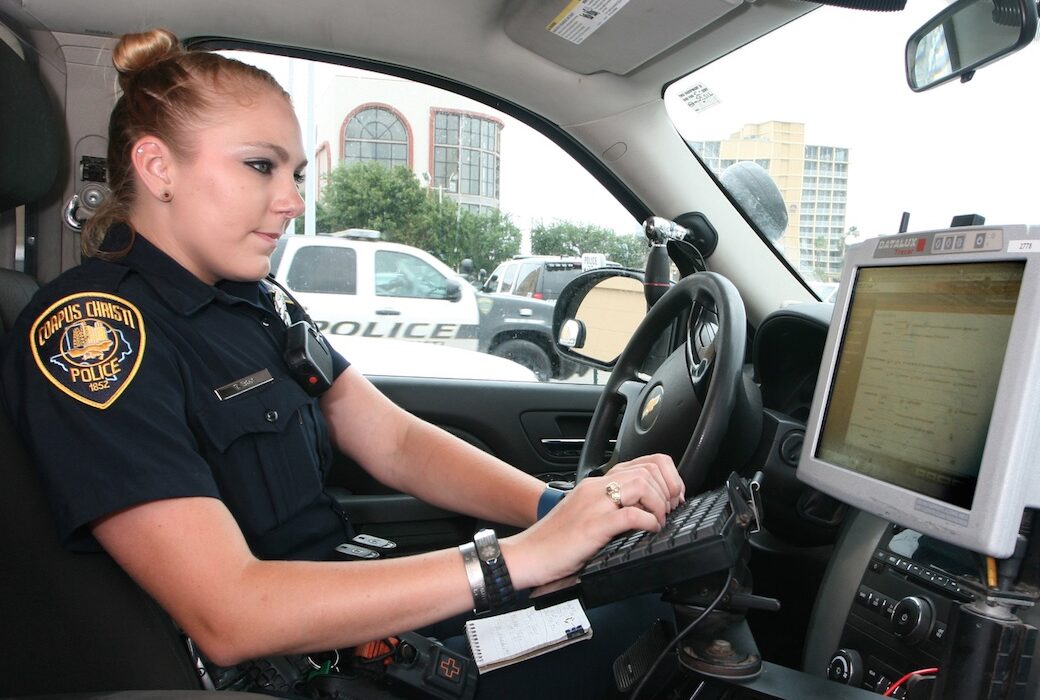
Corpus Christi police officer Tanya Box types in the license plate number and last four digits of the vehicle identification number to generate a crash report. The new Texas Department of Transportation program allows for quick generation of reports for drivers and their insurance companies. Photo by Carrie Robertson Meyer/ Third Coast Photo
Crash reports are back in Corpus Christi, and area insurance agents couldn’t be happier. After a year of not filling out reports for minor vehicle accidents, the Corpus Christi Police Department determined the goal of saving officers time that could be used to reduce crime was not being met, and residents were not being served.
“Officers were still being dispatched to the scene to check for injuries, clear the roadway and make sure information was exchanged between drivers,” said Capt. Billy Breedlove, head of the traffic division. “What we found out was that, just to accomplish that at every crash scene, we weren’t saving time.”
Also during that year-long experiment, the department changed how it files reports, converting to a system used by the Texas Department of Transportation. The system automatically fills in names, addresses and other information with no more than the license place number and the last four digits of the vehicle identification number.
“The new system is much quicker and more efficient, so officers went back to filing out reports with very little grumbling,” Breedlove said. “Officers reported that they could fill out the forms while they were waiting for the wrecker to come clear the roadway.”
The only grumbling, in fact, came from drivers and insurance agents during the year without reports. A crash report with an accurate diagram of the accident proved to be essential in getting quick, positive responses from insurance companies, said agent Randy Russell, owner of Randy Russell Insurance in Portland and Corpus Christi.
“Thank goodness they are going back to that,” Russell told Corpus Christi Business News when asked about the return to crash reports. “It created a lot of outs for the insurance companies as far as not covering claims.”
Instead of an actual report, insurance companies only had the word of one driver against the other.
“I had a lot of customers who had problems,” Russell said. “They would end up having to file on their own insurance because there was no report.”
Some of his customers ended up with damaged vehicles they couldn’t repair because the insurance company wouldn’t pay the claims or would only pay 50 percent or 75 percent of the damage.
“That just blows my mind that they could only pay 50 percent of a claim,” Russell said. “I tried to help where I could, but sometimes, it didn’t work. I hope the police department doesn’t go back to not filing claims. It really caused a lot of problems.”
According to Breedlove — and the data collected from 2010 to 2012 and during the 12 months of no reports — the crash reports are here to stay.
In 2010, it took an average of 91 minutes to work a minor accident. The average for major accidents with injuries was 278 minutes. In 2011, the averages were 123 minutes for minor and 257 for major; and in 2012, 85 for minor and 240 for major.
During the no-report periods in parts of 2014 and 2015, the numbers were unimpressive as far as time saved. In 2014, minor accidents took an average of 74 minutes, major ones took 221 minutes. In 2015, the numbers were 73 for minor and 231 for major.
“If you combine those numbers, you might free up some time,” Breedlove said. “At the same time, we were listening to what the public was saying, and they were having some issues. They wanted those reports. So it wasn’t just a numbers game; it was also about what the public wanted.”
Having the new TxDOT program made the whole idea of saving time to fight crime a wash, he said.
“We can now deliver that service to the public and not waste anymore time doing it,” he said.
“Thank goodness and thank God,” Russell said.





